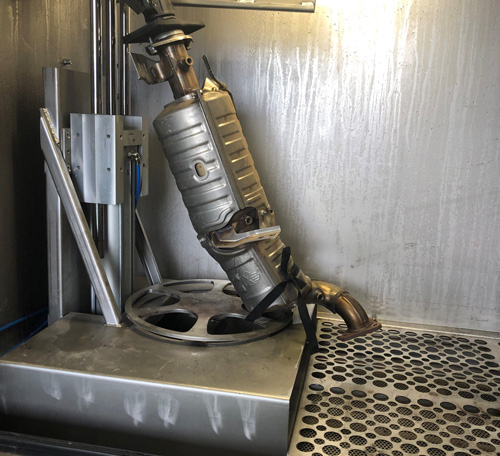DPF Cleaning
Diesel Particulate Filters:What do they do?
Diesel Particulate Filters (DPFs ) are devices fitted to diesel engine vehicles to reduce the sooty particles that diesel engines produce.
We have all seen the black smoke coming from the rear of Diesel vehicles and trucks polluting the atmosphere and the air we breathe. This can penetrate deep into the lungs and is seen as being responsible for an increase in heart and lung problems.
The diesel particulate filter(DPF) has a honeycombed interior, similar to a catalytic converter, which is made of Silicon Carbide. This is inside a stainless steel surround that you can see under the vehicle.
The honeycomb centre is designed to trap the particles of soot which have not been burned off or cleared by an additive.
Some DPFs use an additive which enables them to burn off the soot particles and some are fitted close to the engine which means that the exhaust gases are hot enough to burn off the carbon soot particles.

What are the problems?
When the filter is full and no more soot particles can be trapped the DPF needs to undergo a regeneration process, which converts the soot into smaller particles like a powder.
This will be evident by the performance of the vehicle, loss of acceleration, sluggish performance and higher fuel usage.
There are two types of regeneration – aggressive and passive – within the vehicle.
With the injection of diesel or additive (urea) into the DPF, the exhaust ignites the diesel or additive and an explosion takes place. With the high heat from the explosion, this will in turn cause the soot to burn down into a powder and allow it be expel out of the DPF. This is very aggressive and not all the soot will be removed, therefore it is performed many times which causes damage to the DPF.
Driving at speed of 100Km for 20 minutes at high revs is usually enough to start regeneration if the DPF is not too blocked. This is known as passive regeneration.
Sometimes the DPF will not be given the chance to undergo either of these regeneration processes, and the filter will become too blocked for a regeneration to take place. At this point the vehicle will need to undergo some type of professional service.
The only solutions at this stage which will leave the vehicle in its proper state, is to replace the filter or to use a professional cleaning service like Particulate Solutions SA.
Why is it important to clean a DPF filter?
DPF cleaning will allow vehicles to not only avoid unplanned and costly breakdowns, but achieve better fuel economy and extend the overall life of the vehicle.
